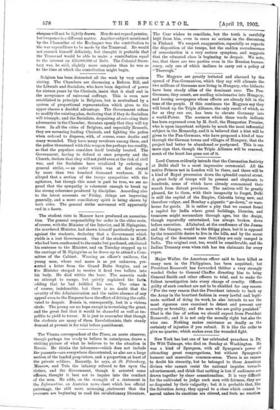Belgium has been distracted all the week by very serious
rioting. The Chambers are discussing a Reform Bill, and the Liberals and Socialists, who have been deprived of power for sixteen years by the Clericals, insist that it shall end in the acceptance of universal suffrage. This is even now established in principle in Belgium, but is neutralised by a system of proportional representation which gives to the upper classes a decided advantage. The Government refuse to modify the existing plan, declaring that if they do Socialism will triumph; and the Socialists, despairing of outvoting their adversaries in the Chamber, threaten openly that they will try force. In all the cities of Belgium, and especially Brussels, they are menacing leading Clericals, and fighting the police when ordered to disperse, with, of course, some deaths and many wounded. They have many revolvers among them, and the police threatened with this weapon fire perhaps too readily, so that the populace considers itself brutally treated. The Government, having to defend at once property and the Church, declare that they will not yield even at the risk of civil war, and the Socialists have retaliated by ordering a. general strike, — an order which was at first obeyed by more than two hundred thousand workmen. It is alleged that a section of the troops sympathise with the agitators, but though this must in part be true, we see no proof that the sympathy is vehement enough to break up the strong coherence produced by discipline. According also to the latest accounts on - Friday, things are improving generally, and a more conciliatory spirit is being shown by both sides. The general strike movement will apparently end in a fiasco.










































 Previous page
Previous page